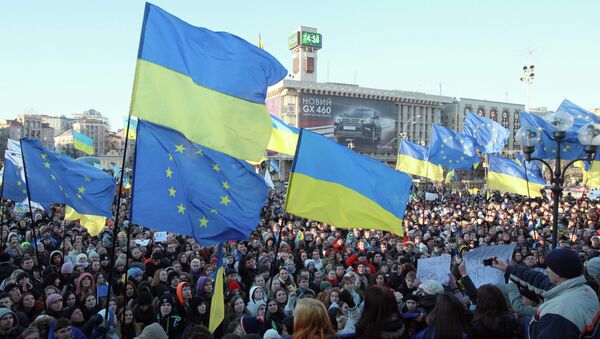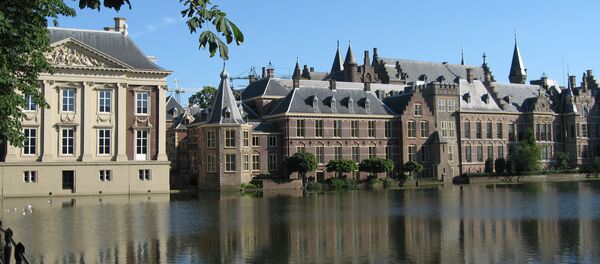MOSCOW (Sputnik) — The Dutch parliament has finally ratified an EU-Ukraine association and free trade deal, stalled since April 2016, when the majority of Dutch voters rejected the deal during a referendum.
Earlier in the day, a Dutch senate official told RIA Novosti that the number of "yes" votes in the 75-member upper house was double that of "no" votes.
Commenting on the issue, European Commission President Jean-Claude Juncker expressed hope that the association and trade agreement would be finalized by July.
A LONG WAY
In 2016, the Netherlands turned out to be the only country which did not ratify the agreement, though it was initially approved by the Dutch Parliament. In April 2016, Dutch voters held a referendum on the issue and rejected the agreement by 61 percent of votes out of fears that the deal would obligate the Netherlands to provide financial or military support to Kiev. Despite low voter turnout and the non-binding nature of the referendum, most Dutch parties agreed to abide by the outcome.
In December 2016, during the EU summit in Brussels, the leaders of the member states agreed that the association deal would not stipulate the granting of Ukraine status of a candidate country for joining the union, would not provide Kiev with guarantees of military or financial assistance, or the right of its citizens to reside and work freely within EU territory. EU leaders also concluded that the EU-Ukraine association deal would come into force only after the deal's ratification by the Netherlands took place.
On Tuesday, the deal was finally supported by the Senate. In order to become official, the agreement should be signed by King Willem-Alexander of the Netherlands and Foreign Minister Bert Koenders, though these are mere formalities. The ratification would be completed only after the document's publication in the Official Gazette of the Kingdom of the Netherlands.
EU-UKRAINE RELATIONS UNDER THE ASSOCIATION DEAL
While some of the provisions of the agreement have already been implemented on an interim basis, for instance, those on financial cooperation, political dialogue, economic and industrial cooperation, the ratification of the deal would lead to implementation of the norms in such fields as foreign policy, security policy, regional stability, prevention of conflicts, crisis management and military-technical cooperation.
Following the ratification of the deal, provisions regarding cooperation on migration, asylum and border management would also become legitimized.
UKRAINE'S REACTION
Ukraine welcomed the recent Dutch decision, with the country's President Petro Poroshenko calling it an "important victory."
"We have gained an important victory together. We have defended the Association Agreement, the path to which had been paved three years ago by the participants of Euromaidan and Revolution of Dignity… Ukraine is gradually integrating into the European policy in many spheres. Entry into force of the Association Agreement, free trade area and visa-free regime with the EU that will start in exactly 10 days are crucially important on our way to the United Europe," Poroshenko said in a statement published on his website.
Poroshenko stressed that the association with Europe was Ukraine's "civilizational choice."
The Ukrainian leader said that the country was strongly committed to reach its strategic goal, which was "the guarantee of freedom, independence and territorial integrity."






